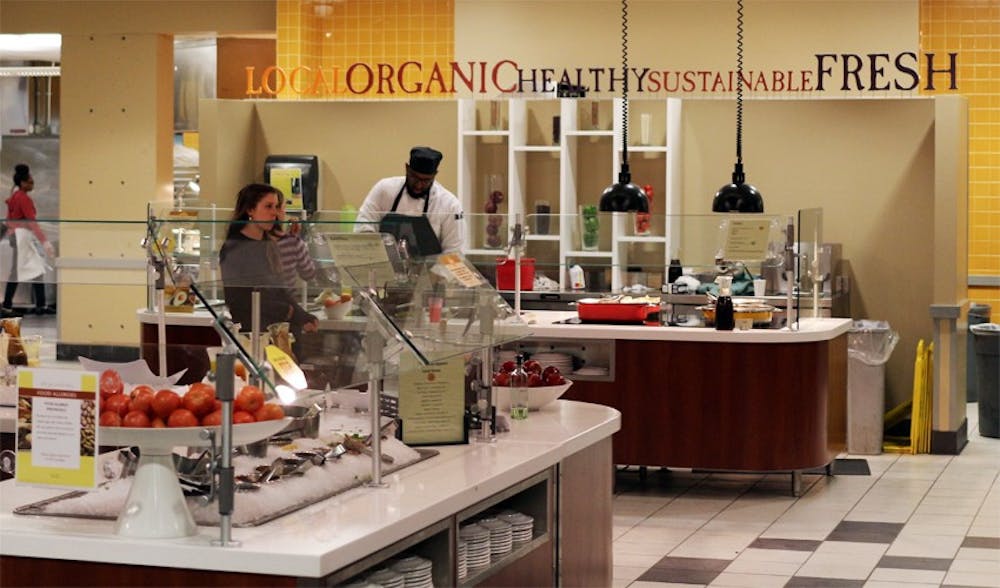
Following the buzz about a cockroach problem in 1920 Commons, the dining hall remains as crowded as ever.
Many students learned of the issue two weeks ago when Under the Button published “The Inconvenient (Health-Threatening) Truth Behind Your Meals,” which detailed several Philadelphia Food Safety Inspection Reports of Penn’s dining halls. But Penn Dining says it has taken measures to ensure the health and sanitation of its facilities.
These free, publicly-available reports also reveal various sanitary concerns for Kings Court English House, Hill House and Falk Dining Commons in Steinhardt Hall. Most notably, the reports indicate a lack of cleanliness in the men’s bathroom at Kings Court in February 2013, past evidence of rodent and insect activity at Hill in January 2013, mouse droppings in the main kitchen of Hillel in December 2014 and “live roaches observed in breakfast and ice cream station areas” at Commons last October.
The UTB article quickly spread across Penn students’ Facebook walls, provoking some gut reactions to Penn Dining’s food safety practices.
“I find it a little worrying that we didn’t find out about the [food safety] problems until someone posted the reports on Facebook,” College freshman JinAh Kim said.
The health and sanitary reports, however, have not coaxed many students to stop eating at the dining halls, particularly not at Commons. According to Bon Appétit’s data, there was a small increase in the number of diners served at Commons since UTB published the article, compared to the same time period last February. Bon Appétit declined to offer more specific statistics on the number of diners.
Penn Dining manages 17 separate dining facilities that turn out slightly over 10,000 meals a day. “We run a huge operation, yet for the past couple of years, we have always passed our health inspections on campus,” resident district manager of Bon Appétit Stephen Scardina said. All of the dining halls, Scardina said, including Commons, have corrected any past violations cited by Philadelphia’s Office of Food Inspection. The live-roach violation from October was the only such violation Commons had received since August 2011.
Students who eat at Commons can now rest assured that their scoop of ice cream or breakfast platter will not contain an unwelcome friend.
“Just in the past week we had an inspection done for the 1920 Commons facility, and the technician’s report came back negative — there has been no recent activity in 1920 Commons,” Scardina said. The cockroach infestation was cleared up immediately following the October inspection and has remained cleared up since, he said.
“The health and wellness of our students is paramount to everything that we do,” Pam Lampitt, the director of Business Services who oversees Penn Dining, said. “We take the food safety and cleanliness of our buildings very seriously — this is not something to take lightly. Food safety is our business.”
But Bon Appétit and Penn Dining depend on more than health inspections to determine whether or not every dining facility is safe. “We are assessing food safety all of the time,” Lampitt said. “We don’t just start to respond after one Philadelphia health inspector — that is not a prudent way to go about things.”
Bon Appétit has its own inspector regularly checking every operation without prior notice, but Bon Appétit also hires additional help from outside Penn, such as Ecolab Pest Elimination. Depending on the size of a dining operation, a technician comes once or twice a week to inspect each building and provide pest control.
Bon Appétit also contracts with EcoSure, a company that comes in once a semester to assess the food safety of every Bon Appétit-run facility on campus. “Another thing we do is biweekly self-inspections,” Scardina added. “Different managers go to a different operation from their own and do a self-inspection with fresh eyes.”
Penn Dining launched Student Ambassadors in the fall of 2014, a program that has turned a dozen Penn students into a fleet of undercover dining facility inspectors. These student ambassadors are trained to inspect for proper food safety practices at dining facilities regularly.
“There are things that we can constantly control, and there are things like pest movement that we can only respond to,” Lampitt said. “We cannot control the construction or trash situations across the street which alter pest movement, but we do responsibly manage the response to pests.” The construction of the Perry World House was a likely contributor to the cockroach infestation, she said.
“If a student has any type of concern at all in a dining facility, they should direct that concern to a manager on duty who will take care of it,” Scardina said. “If there is ever any type of sighting, we will contact Ecolab who will immediately send out a service technician.”
Related: Critical violations found in Bon Appétit facilities, 2013
The Daily Pennsylvanian is an independent, student-run newspaper. Please consider making a donation to support the coverage that shapes the University. Your generosity ensures a future of strong journalism at Penn.
DonatePlease note All comments are eligible for publication in The Daily Pennsylvanian.







